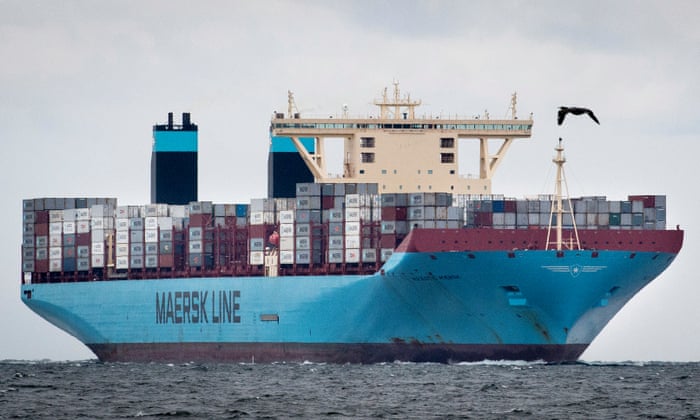Iran's Economic Stall

"German-Iranian economic relations are lagging their potential."
"The moderately positive development in business with Iran comes with a big question mark [courtesy of U.S. President Trump's decision not to extend a moratorium on sanctions]."
Volker Treier, Association of German Chambers of Commerce and Industry
"We are working on plans to protect the interests of European companies."
Maja Kocijancic, spokeswoman, European Commission
"[Licenses permitting Boeing and Airbus to sell to Iran] will be revoked."
"The objective is to put and maintain maximum sanctions on Iran."
U.S. Treasury Secretary, Steven Mnuchin
 |
Denmark’s Maersk said it was joining an exodus of companies ceasing commercial activity in Iran.
Photograph: Axel Schuett/EPA
|
The deal signed with Iran on ending sanctions when the Republic agreed to suspend their nuclear plans for the duration of the agreement, saw an excited, anticipatory influx of European and American corporations, anxious to invest in Iran, to take advantage of a large market of 82 million people, with the country's vast oil reserves, for their wares and services. Iran represents an example of an emerging economy, its vast overseas treasury restored and sanctions lifted, enabling it theoretically to get on with expanding its economy.
Unfortunately, what Tehran's Ayatollahs decided to do with the vast windfall was to largely expend it on pursuing its strenuous bid for command of the Middle East, extending its influence and its military stealth operations throughout the region in its shoring up of Shiite-led Arab countries like Iraq, Yemen, Syria and through its terrorist agency Hezbollah, Lebanon.
The 2015 agreement to shut down its nuclear weapons program did end economic sanctions. Enabling Iran to expend treasury on upgrading its ballistic missiles systems. An obvious requirement both to pair with the nuclear warheads it would resume designing and producing, once the agreement reached its end-life, and to not-too-subtly threaten the majority Sunni Arab leadership in the Middle East and beyond.
That Iran continued to invest in the support of terrorist groups like Hezbollah and Hamas, the former to aid the Republican Guard Corps in Syria supporting its murderous tyrant, the latter to continue threatening Israel's existence, to be joined by Hezbollah once the matter of Syria was finally settled, didn't bother Europe one whit. It did disturb President Trump, to the extent that he chose to take the U.S. out of the agreement, leaving Europe dangling and the Ayatollahs livid. The best-laid plans....
European corporate interests are on tenterhooks; their expectations for gain and profit in Iran somewhat entangled with reality. Daimler and PSA Peugeot Citroen, linked with Iranian partners to sell vehicles; Siemens made a deal to deliver locomotives; Total of France's project to explore offshore natural gas; all now in abeyance, waiting for the other shoe to drop. Despite Europe's defiance and pledge to Iran that it was prepared to carry through on their part of the agreement.
Except, except ... with renewed sanctions, and observing the balance of reality where Europe does far more business with America in trade than it ever would with even a surging Iran, and the United States has the clout to interfere with their banking and their business dealings does come as rather a sobering reality. Ideally, could European officials protect their companies by shielding them from U.S. sanctions and still do business in Iran ... but they cannot.
The German manufacturers who did so spectacularly well selling factory machinery, power grid infrastructure and construction equipment to help begin build the Iranian economy into modernity is fading...fading. Iran's is a dysfunctional economy; ownership of its most important industries are now in the hands of the leaders of the Iranian Republican Guard, and corruption is so rife that the leading Ayatollahs are immensely wealthy, while ordinary Iranians suffer privation.
Reality is that exports from the EU to Iran came to 10.8 billion euros; about $12.8 billion, ranking Iran 33rd among the EU's trading partners, behind even Kazakhstan and Serbia. Airbus of France had signed a deal with Iran Air to replace its aging fleet with over 100 jets, including super jumbo A380s. Three jets have been delivered to the present. Iran's weak economy has disrupted plans for Daimler to co-produce Fuso brand trucks with Iran Khodro.
Aspirations never to be fulfilled.
Labels: European Union, Investment, Iran, Nuclear Agreement, Sanctions, Trade, United States

<< Home